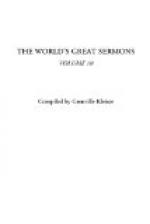GUNSAULUS
THE BIBLE VS. INFIDELITY
BIOGRAPHICAL NOTE
Frank Wakely Gunsaulus was born at Chesterville, Ohio, in 1856. He graduated from Ohio Wesleyan University in 1875. For some years he was pastor of Plymouth Church, Chicago, and since 1899 pastor of Central Church, Chicago. He is also president of the Armour Institute of Technology. He is a fascinating speaker, having a clear, resonant voice, and a dignified presence. His mind is a storehouse of the best literature, and his English style is noteworthy for its purity and richness. He is the author of several books and is in popular demand as a lecturer.
GUNSAULUS
Born in 1856
THE BIBLE VS. INFIDELITY[1]
[Footnote 1: Preached as an impromptu reply to R.G. Ingersoll. Printed from an unrevised stenographic report.]
There are, it may be, so many kinds of voices in the world, and none of them is without signification.—I Cor. xiv., 10.
Ours is a voiceful era. Perhaps, as the ages come and go and man’s life grows richer, its questions more restless for answer, its moral supports called upon to bear heavier interests of faith, its enterprises more often and searchingly compelled to defend themselves, the voices of time will be increasingly potent and worthy of his attention. A singularly suggestive collection of messages fills the air today, and all of these voices speak of one theme—the Bible.
Anarchy, which is always atheistic, holds its converse in the places of evil which this book’s message would close forever; the foes of that civilization builded on its laws and stimulated by its hopes asks us to condemn it as worthy only of caricature, vituperation, and hate. Let us find a path of duty today, not refusing to listen to any of these voices, but asking that other voices also may help us to the truth.
The preacher’s message is a book called the Bible. That is only the literary form of his message—telling its history. Even that form, which is much less divine as paper and ink are less lofty in the scale than humanity, has worked wonders. To-day, the Bible offers the nineteenth-century infidel as testimony of the influence it has. It has force enough to make infidelity preach tearfully and well about man, woman, and child. Skepticism did not do so well until the Bible came. The Bible has furnished the eloquence of infidelity with such a man as Shakespeare to talk about; no student of literature could imagine Shakespeare without the Bible and the Bible’s influence upon him as he created his dreams. It furnished an Abraham Lincoln for an orator to compare favorably with incomplete ideas of Almighty God; but it seems to have been unable to show the critic that Christian ideas of Almighty God made Lincoln so love the Lord’s Prayer that




